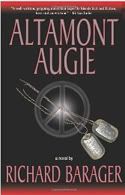Book Review: ALTAMONT AUGIE by Richard Barager


“What kind of man goes to one of the biggest rock concerts of the sixties, manages to drown in a nearby irrigation canal an hour into the show, and is never identified?”
With that opening sentence, Altamont Augie by Richard Barager grabbed my attention and riveted me for 300 pages.
The 1969 concert held at Altamont Raceway outside San Francisco was meant to be California’s version of Woodstock, but became an infamous debacle after concert security (manned by Hell’s Angels) stabbed a man to death. (This is not the fictional man who drowned in the canal.)
 Richard Barager’s debut novel is set against the back drop of 1960s America, the Vietnam War, and the ever increasingly violent anti-war protests of the time. It is the story of David and Jackie, young people on opposite sides of those divisive issues, but who have a passion for each other that connects them through it all. David’s story unfolds in Vietnam, Jackie’s at the University of Minnesota and in California. After David’s tour of duty, he returns to the States and takes up his relationship with Jackie who is now involved with Kyle Levy, a militant anti-establishment activist.
Richard Barager’s debut novel is set against the back drop of 1960s America, the Vietnam War, and the ever increasingly violent anti-war protests of the time. It is the story of David and Jackie, young people on opposite sides of those divisive issues, but who have a passion for each other that connects them through it all. David’s story unfolds in Vietnam, Jackie’s at the University of Minnesota and in California. After David’s tour of duty, he returns to the States and takes up his relationship with Jackie who is now involved with Kyle Levy, a militant anti-establishment activist.
The identity of the man in the canal is determined early on in the book but the answer to the question “What kind of man…?” remains, and is answered by the story that follows. The plot advances steadily and evenly over the five year period from 1964 to 1969, building to a climax at the Altamont concert.
I came of age in the late sixties and early seventies and although I was just a year or two too young for Woodstock, I  embraced the ‘summer of love’ and peace movement ideology as most of my friends did. Being Canadians removed us from the immediate political arena around Vietnam, allowing us to see the issue from only one side. It was the era of not only “Mary Quant miniskirts, white go-go boots, flash cubes, color broadcasting on all three networks, and static-free radio”; to us the times were world-changing and thus clothed in importance and valour. So I was astounded to read the narrator’s opinion: “No matter how absurd the decade appeared in the century’s rear-view mirror, it had at least aspired to be relevant.” Absurd?! We were absurd? No way!
embraced the ‘summer of love’ and peace movement ideology as most of my friends did. Being Canadians removed us from the immediate political arena around Vietnam, allowing us to see the issue from only one side. It was the era of not only “Mary Quant miniskirts, white go-go boots, flash cubes, color broadcasting on all three networks, and static-free radio”; to us the times were world-changing and thus clothed in importance and valour. So I was astounded to read the narrator’s opinion: “No matter how absurd the decade appeared in the century’s rear-view mirror, it had at least aspired to be relevant.” Absurd?! We were absurd? No way!
Barager’s writing style is slightly pretentious in his use of large words on nearly every page. Gems such as ‘senescence’, ‘leporine’, and ‘reliquary’ at first sent me running to my dictionary. But that was interrupting the story, so I marked them for further research and determined from the context meanings close enough to allow me to understand the story and move on.
But the overdone vocabulary is my only complaint about this book. Barager has crafted a keenly insightful look into the politics of the 1960s, presenting both sides, but with a protagonist who represents a view that was decidedly unpopular among youth of the day. How had it come to this, he wondered, needing to persuade an entire generation of Americans that it was better to win a war than to lose one? In some ways, this is a courageous book, as many still hold those views of their youth, and America and perhaps the world may still be as divided as ever on that issue.
But I would urge you to keep an open mind and read this book. I learned a lot about the decade that I’d not known – because I was young, because I’m Canadian, and because my friends accepted the issues superficially, as did many youth. Even if you were more involved in the politics of the era, you’ll be certain to learn aspects of the fight on both sides that will make you reflect. If you missed the sixties the first time around, I can’t think of a better introduction to the issues of the day than Altamont Augie.
When I first read Altamont Augie, I rated it 4.5 stars but over the last month and a half, it’s provided much fuel for discussion in our household and food for thought. It’s been a while since I’ve read such a thought-provoking book, one that stays with me as Augie has, so I’ve upped my rating to a full five stars,


I never could understand why they hired Hell’s Angels for security. That seems at least counterproductive, if not absolutely insane. And I agree the 60s protestors were not absurd as a whole. There were absurd factions of course but, hey, we stopped the Vietnam War for Pete’s sake!
Barbara, the story goes that the Rolling Stones had used English Hell’s Angels in an earlier concert in the U.K. and it worked out well. Jagger didn’t realize that the U.S. outfit is a different kind of group. But in their ‘defense’: the guy they killed had a gun and was waving it around.
If you watch the Altamont section of the Stones documentary of Gimme Shelter, you’ll see that the stage was very low (unlike Woodstock) and people (and a dog!) were wandering around on it (while The Stones were performing, for crying out loud!). There was a huge press of stoned, unruly people and it was just an impossible situation.
And, yeah, what could be absurd about wanting peace?
I’d like to read this… just need to find some time to do it. I too grew up in the 60s but was a few years too young to experience Woodstock or the unrest on college campuses. I graduated high school the year the war ended, and by the time went away to college everything had settled down (much to my parents relief!).
I’m sure they were relieved, Leslie! Protests kept getting uglier & uglier as the war dragged on.